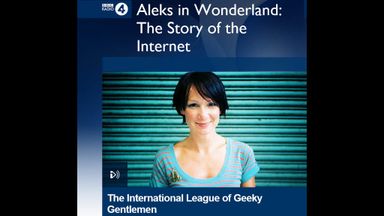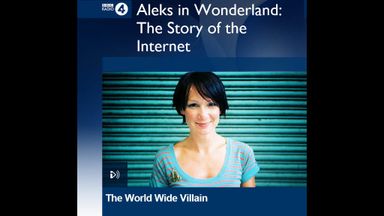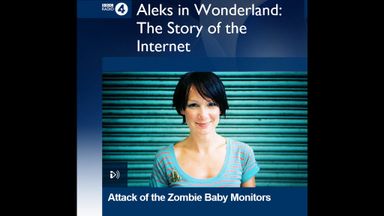Aleks in Wonderland: The Story of the Internet
1. The International League of Geeky Gentlemen
Clips from this programme
Introduction: Steve Wozniak, Apple Co-founder testing the boundaries: hacking, Phone phreaking, calling the Pope. Have things gone too far on the Internet: Cyber-Attacks (NHS), Power of the Internet, the dark-side, IS, ransomware (Aleks Krotoski)
Duration: 03:23Understanding the Internet: ARPA (Advanced Research Projects Agency) , US military communication network needed resilience to attack. David (Donald) Davies (Roger Scantlebury, NPL National Physical Laboratory), packet switching network
Duration: 05:08Security controls (User and File authentication) should have been included in the first Internet protocols for mass global consumer use, but were not; The early network was small and only used by a trustworthy community of scientists. 'Micro Live Telecom Gold item with Bulletin Board indexes and modems,
Duration: 02:52Richard Bartle (Senior Lecturer and Honorary Professor of Computer Game Design, University of Essex) MUD game (Multi-User Dungeon), a shareable text-based world, Geeks and engineers' act of defiance against attitudes to people: Liberal and open-minded attracted to the new computer technology, with control over misbehaviour on the network
Duration: 07:08Internet access for the masses, BBC Micro, hacking, Passwords, mass access to lax systems; Facebook users: 2 billion active users per month, The Eternal September, AOL (America Online), Usenet, ISPs (Service providers) provide Usenet access to many without self-policing of the WWW (World-wide web)
Duration: 04:56Network etiquette: Laurence Canter (Immigration Lawyer) and Martha Siegel: Usenet's / Internet's first SPAM in 1994
Duration: 03:06Next time: The World-wide Web: A new look for the Internet: Sir Tim Berners-Lee invented the World Wide Web in 1989
Duration: 01:22Aleks in Wonderland: The Story of the Internet
1. The International League of Geeky Gentlemen
First broadcast: 16th August 2017
Duration 27:53
Just how did the Internet become the most powerful communications medium on the planet, and why does it seem to be an uncontrollable medium for good and bad? With no cross border regulation the internet can act as an incredible force for connecting people and supporting human rights and yet at the same time convey the most offensive material imaginable. It has become the most useful research tool on earth but also the most effective way of delivering threats to the security of governments, the health service and on a personal level our own identities. In this series Aleks Krotoski unravels the complexity of the internet, meeting the people who really invented it, looking behind the myths and cultural constructs to explain what it actually is and how it came to exist outside of conventional regulation. We'll ask whether the nature of the net itself really is cause for concern - and if so what can be done to reign in the negatives of the internet without restricting the positives? In this first episode we go back to the days before the internet to look at the cultural and technological landscape from which it grew, and unravel some of the key moments - now lost in time and obscured by technology folklore, which mark when the internet lost its innocence.
Now playing
2. The World Wide Villain
First broadcast: 23rd August 2017
Duration 28:04
With the coming of the World Wide Web in the 1990s internet access opened up to everybody, it was no longer the preserve of academics and computer hobbyists. Already prior to the web, the burgeoning internet user groups and chatrooms had tested what was acceptable behaviour online, but access was still limited. Aleks Krotoski asks whether the Web through enabling much wider use of the internet is the villain of the piece in facilitating not just entertainment and commerce, but all aspects of the darker side, from malicious computer hacking attacks, worms and viruses, to new channels for criminality, online extortion and identity theft.
3. Attack of the Zombie Baby Monitors
First broadcast: 30th August 2017
Duration 27:56
Can we Control the Dark Side of the Internet?The Internet is the world's most widely used communications tool. It's a fast and efficient way of delivering information. However it is also quite dumb, neutral, treating equally all the data it passes around the world. From data that forms scientific research papers, the wealth of social media to keep us all connected with friends and relatives, entertainment or material we would rather not see- from political propaganda to horrific violence, the Internet makes no distinction. Is it time to change that? And can we? In this programme Aleks Krotoski looks at whether it's possible to use technological fixes to regulate the internet or whether a more political approach is needed to governance of this vital but flawed communications medium









